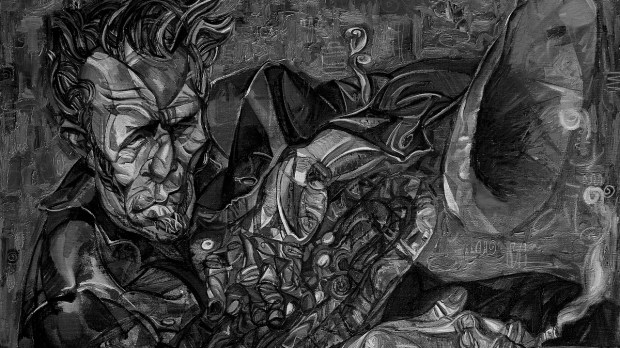On March 6, 1973, a 23-year-old nightclub singer named Tom Waits released his first album, Closing Time. Best known for The Eagles’ cover of the opening song, “Ol’ ’55,” Closing Time did not predict the trajectory that Waits’ career would take over the course of his next 16 studio albums, or just how deeply the artist has probed into the human condition through songs infused with Christian theological symbols and reflection.
Waits’ religiously inflected songs provoke the listener out of pious complacence. He confronts us with hard questions about the nature of God, the problem of evil, and the scope of redemption. Sometimes God can be hidden and elusive, seemingly indifferent to the world as we observe it.
But for Waits, God does not seem to be hidden because of his essential being, but because he has been obscured by the deeds of fallen man.
In “A Little Drop of Poison,” for example, the narrator asks, “Did the Devil make the world/While God was sleeping?” The “world” is one of betrayal, greed and abandonment, in which it is difficult to find any redemptive qualities in either people or human institutions. In another song, Waits writes, “There’s a leak, there’s a leak, in the boiler room/The poor, the lame, the blind/Who are the ones that we kept in charge?/Killer, thieves and lawyers.”
This world is filled with false promises and cynical assurances: “There’s always free cheddar in a mousetrap, baby/It’s a deal, it’s a deal.” Love is shallow and loyalty is illusory: “I’d sell your heart to the junkman, baby/for a buck, for a buck/If you’re looking for someone to pull you out of that ditch/You’re out of luck, you’re out of luck.” Why all this falsehood, deceit, and depravity? Because, as the name of the song summarizes the issue, it seems that “God’s away on business.”
But for Waits, the indictment is against us, not God. Implicit in each of these songs is the observation that we — who are made in the image and likeness of God — have failed to form our lives consistent with that nature. Waits’ characters look around and see little of God’s presence in the world because they see few examples of God’s followers making him present. It’s a fallen world of strife, violence and deception. Thus, in “Road to Peace,” Waits’ singer ruefully wonders, “If God is great and God is good/Why can’t he change the hearts of men”? And he offers a tentative answer: “Well, maybe God himself is lost and needs help/He’s out upon the road to peace.”
But, writing with a Christian sensibility, Waits knows that this is not the whole story. The fallen human predicament is dire, but it is not hopeless. It may, in fact, be the very key to understanding God’s gracious act of redemption. In “Way Down in the Hole,” the narrator intones, “If you walk with Jesus/He’s gonna save your soul/You gotta keep the devil/Way down in the hole.” This is because God’s “got the fire and the fury/At his command/Well you don’t have to worry/If you hold on to Jesus’ hand.”
Put another way, God is at work redeeming the times, but we must join the work. “The world is not my home/I’m just passing through,” he writes in “Come On Up to the House,” a song that wouldn’t be out of place in a collection of spirituals. “The seas are stormy and you can’t find no port/Gotta come on up to the house.” In “Lord I’ve Been Changed,” a character croons, “I know I got religion/Lord knows I’m not ashamed/Well a Holy Ghost is my witness/And the angels done sign my name.”
Finally, in “Down There by the Train,” Waits expounds on the extravagant generosity of God’s grace. “There’s a place I know where the train goes slow/Where the sinner can be washed in the blood of the Lamb.” Waits challenges us to expand our theological imagination and narrow our prejudices. “There’s no eye for an eye, there’s no tooth for a tooth/I saw Judas Iscariot carrying John Wilkes Booth.” The passengers waiting for the train include “All of the shamefuls and all of the whores/And even the soldier who pierced the side of the Lord.” God’s grace is expansive enough to include anyone who will “meet me down there where the train goes slow.”
In unconventional ways, this is the Gospel that Tom Waits has been preaching for 50 years.
Kenneth Craycraft, an Associate Professor of Moral Theology at Mount St. Mary’s Seminary and School of Theology in Cincinnati, originally wrote this article for OSV News.



